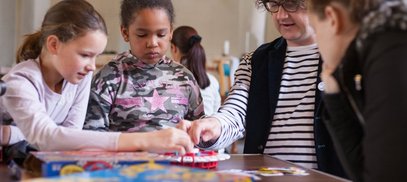By Jonathan Douglas CBE, Chief Executive of the National Literacy Trust
Last Easter Sunday, the impact of the pandemic on children’s literacy was highlighted with new reports that 200,000 year six students now face the reality of starting secondary school with low literacy- an increase of 30,000 students over the past year alone. The numbers are stark but this is consistent with what we have seen throughout our work with schools and local communities. While children and young people have thankfully largely avoided the physical health impacts of COVID-19 they have been subject to education disruptions and barriers to socialising which have had a tremendous impact on their education and overall wellbeing.
This “shadow pandemic” has disproportionately impacted children from our most disadvantaged communities which are in the most need of leveling up. But the current harm is only the tip of the iceberg and, if left unaddressed, risks having lifelong ramifications. I can only echo Dame Rachel de Souza, the children’s commissioner for England, who notes that children have “paid a huge price for the measures we’ve had to take to contain [the pandemic].”
We may have all been navigating the same storm over the past year but we must recognise that we were doing so in different boats. Children who had access to good internet, access to books and were supported by parents who were confident in taking on educational responsibilities had one experience while children from disadvantaged communities often simply didn’t have access to these resources and as a result faced a very different lockdown. This has exacerbated our socioeconomic achievement gap. The already disadvantaged have only fallen further behind given that the external support, such as access to library books and onsite school resources, they traditionally relied upon were simply not available.
The numbers bear this out. Analysis by the Education Endowment Foundation (EEF) found that school closures as a result of COVID-19 are likely to reverse all progress that was made over the last decade to narrow the attainment gap. While the Department for Education concluded last autumn that all year groups had experienced a learning loss in reading. In primary schools alone this loss averaged between 1.7 and 2.0 months- And this was before the second and third lockdowns. We can only expect the level of need to have increased since then.
It is essential that this unprecedented national literacy challenge is addressed. As we have argued in the past, lacking vital literacy skills holds a person back at every stage of their life. As a child they won't be able to succeed at school, as a young adult they will be locked out of the job market, as a parent they won't be able to support their own child's learning. Letting this intergenerational cycle play out once more without taking direct action, especially in these uncertain times, will only leave social mobility and a fairer society farther out of reach.
The challenge is significant but not insurmountable. Indeed, teachers have gone above and beyond for the past year in order to retain some semblance of stability in the lives of our children. Supporting them and their work is vital to our recovery. However, teachers cannot address the literacy attainment gap alone. They are already under considerable pressure and we must avoid making the mistake of asking them to do more with less.
But there are alternative ways to support literacy. At the National Literacy Trust, we have long been advocates for place-based approaches to literacy, as every community faces unique challenges and therefore has different needs. Our work has shown that by working with partners, from businesses to volunteers, a more integrated approach to literacy can be developed and as a result, help reduce the burden on teachers.
Another good approach is developing literacy through play since children develop language and literacy through everyday social activities. Indeed the evidence shows that the relationship between language development and socialisation is crucial. Now that we are emerging out of lockdown, there is a huge opportunity here for educators and community supporters to try new ways of engaging children with learning. Our recent Literacy by Stealth conference explored many of these.
While the challenges are clear, we should not forget the successes we’ve had throughout the pandemic and the resilience children have demonstrated. For example, our research on children and young people’s writing showed that many children developed new and positive writing habits during the first lockdown by expressing themselves through creative writing. Indeed, 39.7% reported writing more fiction 39.3% more letters, and 27.1% writing more in a diary or journal. This creative response to lockdown should be valued and supported when government outlines its catch-up strategy next month.
The scale of the crisis and the challenges ahead cannot be ignored. Which is why I was heartened by Sir Kevan Collins remarks last week that local solutions are needed to solve problems in education and drive forward the COVID-19 recovery. Proposed solutions and approaches might vary but the need is clear. The pandemic has had a disproportionate impact on the educational outcomes of our poorest communities. We look forward to engaging with government as plans to address this become formalised. In the meantime, we will continue doing what we can to provide children and young people with a refuge during a time of great uncertainty.
Today marks one month of schools being open to everyone after a long period of disruption. At the National Literacy Trust, we are recruiting business partners to work with us over the next three years on our recovery campaign. To find out more, please contact partnerships@literacytrust.org.uk.
